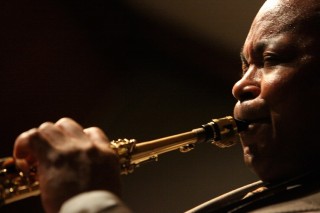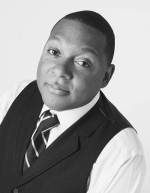Title

Victor Goines will lead the Juilliard Jazz Orchestra in the music of Benny Goodman on February 25; the concert will also include music by Duke Ellington led by Wynton Marsalis.
(Photo by Ayano Hisa)The February 25 Juilliard Jazz Orchestra concert, which is called The Activist Benny Goodman and the Ambassador Duke Ellington: Democracy at Home and Around the World, has many facets. For one thing, it gives the student performers a chance to immerse themselves in the music of some of the genre’s giants. And that, in turn, is one of the larger purposes of Juilliard Jazz, according to Wynton Marsalis (’81, trumpet), who became its director last year. The concert is also a homecoming of sorts. Marsalis—who was one of the original forces behind the creation of what was then called the Juilliard Institute for Jazz Studies when it opened its doors, in 2001—will direct the orchestra in the Ellington works. The guest coach for the performance will be clarinetist and saxophonist Victor Goines, the first director of the jazz program, who will lead the orchestra in the Benny Goodman half of the program.
Guest coach Victor Goines leads music by Benny Goodman; Wynton Marsalis, the director of Juilliard Jazz, conducts music by Duke Ellington.
Body
From the beginning one of Juilliard Jazz’s main goals was to give all the students a foundation in the history of the music so they could find their voice as a performer. That’s still key today, Marsalis said in a recent interview with The Journal. In addition to knowing the history of the music, he noted, “we want the students to be able to play with the same type of emotional impact and intelligence as the musicians who established jazz as a great art form.” The program also wants its graduates “to be leaders, able to represent our music all around the world.”
The February 25 concert, which celebrates the music of two jazz pioneers, covers both those bases. Goodman (1909-86) was a clarinetist and bandleader known as the King of Swing, who, among many other achievements, was renowned for having integrated bands in the 1930s. Bandleader and composer Edward “Duke” Ellington (1899-1974) also elevated the genre immeasurably. When he was posthumously awarded a Pulitzer Prize, in 1999, the citation read, in part, that it was “in recognition of his musical genius, which evoked aesthetically the principles of democracy through the medium of jazz and thus made an indelible contribution to art and culture.”
Benny Goodman and his Swing Orchestra's famous 1938 Carnegie Hall concert featured an inspired, toe-tapping version of “Sing, Sing, Sing” and other classics of the Swing Era. Duke Ellington’s “Far East Suite,” “Afro-Eurasian Eclipse,” and Latin American “Suite” typify the aural portraits he created from his worldwide travels.
When students absorb those—and any—songs, Marsalis said, they’ll focus on developing an intensive understanding of them. It won’t be a matter of just harmony and tune, but also “everything around that song. The sociology, what was going on at the time, what the song represented, who was playing that song, what did the leader want, the philosophy of the people playing in that group, how the rhythm section interacted.”
Something else that differentiates Juilliard Jazz, he said, is “our focus on American roots—music like gospel, spirituals, blues, and folk. These are things that give you a melodic vocabulary to improvise in.” That intense focus means that, over the course of their Juilliard education, students will be able “to put together the entire history of jazz and that way they will know about American history, the social development in our country.” And since “jazz touches all aspects of a modern life,” he added, the program will “put them in a position to interface with people who are making a difference with this music in many different venues.”
While the Juilliard Jazz students—there are 41 this year in undergraduate and graduate programs—will have a rigorous exposure to the greats of the field, there are other aspects to their training including courses that let them take advantage of business opportunities that come through Jazz at Lincoln Center, where Marsalis is the artistic and managing director. “They’ll learn about development, production, marketing, booking concert, all the things that Jazz at Lincoln Center does. We very much want to prepare our students to have an impact and to be able to create jobs.”





